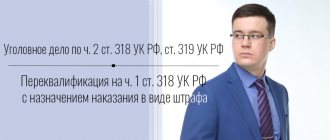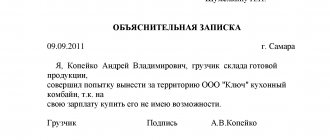Degradation of personnel, lack of professionals in investigations and inquiries is becoming an increasingly common occurrence. From an independent procedural figure, the investigator and interrogator are gradually turning into employees without personal opinion and any initiatives. Everything is at the discretion of the prosecutor, all actions are done with an eye on him. One of my cases is clear proof of this.
To all my conversations regarding the qualification of the act (and this is clearly the 330th) I received the same answer: yes, we agree, but the prosecutor’s office decided so, which means we will send him to court in this form. And what did you get in the end? After two returns from the prosecutor, the charges were reclassified. However, first things first.
Judicial practice: sentences and punishment under Art. 330 of the Criminal Code of the Russian Federation
- Resolution of the Plenum of the Supreme Court of the Russian Federation dated... PLENARY OF THE SUPREME COURT OF THE RUSSIAN FEDERATION DECISION dated December 27, 2002 N 29 ON JUDICIAL PRACTICE IN CASES OF THEFT,...
- Resolution of the Plenum of the Supreme Court of the Russian Federation dated... PLENARY OF THE SUPREME COURT OF THE RUSSIAN FEDERATION DECISION of November 15, 2016 N 48 ON THE PRACTICE OF APPLICATION BY COURTS OF LEGISLATION GOVERNING FEATURES...
- Decision of the Supreme Court: Determination N 203-APU17-21... THE SUPREME COURT OF THE RUSSIAN FEDERATION Case No. 203-APU17-21 APPEAL DECISION Moscow August 31, 2022 Judicial Collegium for Military Personnel of the Supreme...
- Resolution of the Plenum of the Supreme Court of the Russian Federation dated... PLENAUM OF THE SUPREME COURT OF THE RUSSIAN FEDERATION DECISION dated June 25, 2022 N 18 ON JUDICIAL PRACTICE IN CASES OF CRIMES,...
- Resolution of the Presidium of the Supreme Court of the Russian Federation dated... PRESIDIUM OF THE SUPREME COURT OF THE RUSSIAN FEDERATION DECISION dated December 5, 2018 N 126-P18 ON RESUMING PROCEEDINGS IN THE CASE DUE TO NEW...
- Ruling of the ECtHR dated 02/14/2017 EUROPEAN COURT OF HUMAN RIGHTS THIRD SECTION CASE “MASLOVA VS. RUSSIAN FEDERATION” (Complaint No. 15980/12) JUDGMENT…
- Resolution of the Plenum of the Supreme Court of the Russian Federation dated... PLENAUM OF THE SUPREME COURT OF THE RUSSIAN FEDERATION DECISION dated December 17, 2022 N 43 ON SOME ISSUES OF JUDICIAL PRACTICE IN CASES...
- Decision of the Supreme Court: Resolution No. 310P13 dated... DECISION OF THE PRESIDIUM OF THE SUPREME COURT OF THE RUSSIAN FEDERATION Case No. 310-P13 Moscow January 23, 2014 Presidium of the Supreme Court of the Russian Federation...
- Judicial Collegium for Criminal Cases, appeal:... THE SUPREME COURT OF THE RUSSIAN FEDERATION Case No. 72-APU 17-21 APPEAL DECISION Moscow October 04, 2022 Judicial Collegium for Criminal Cases...
- Decision of the Supreme Court: Determination No. 38-АПУ17-2 dated... THE SUPREME COURT OF THE RUSSIAN FEDERATION No. 38-АПУ17-2 APPEAL DECISION Moscow March 1, 2022 Judicial Collegium for Criminal Cases of the Supreme Court...
Verdict under Part 2 of Article 330 of the Criminal Code of the Russian Federation
Criminal case No. 1-16
№ 19475
PRI G O V O R
IN THE NAME OF THE RUSSIAN FEDERATION
village Orichi January 27, 2011
Judge of the Orichevsky District Court of the Kirov Region Vasiliev S.V.,
under the secretary Kapustey I.S.,
with the participation of the state prosecutor, assistant prosecutor of the Orichevsky district, M.V. Bizyayeva,
defendant Konstantin Sergeevich Komarov,
victim S.,
representative of the victim O.N. Smolina,
defender Shubin O.M., who presented certificate No. 331 and warrant No. 00039,
having considered in open court in a special procedure for making a judicial decision a criminal case on charges
Komarov Konstantin Sergeevich
, <…>, not convicted,
in the commission of a crime under Part 2 of Art. 330 of the Criminal Code of the Russian Federation,
U S T A N O V I L:
Defendant Komarov K.S. committed arbitrariness, that is, unauthorized, contrary to the procedure established by law or other regulatory legal act, the commission of actions, the legality of which is disputed by a citizen, if such actions caused significant harm, committed with the use of violence and with the threat of its use.
The defendant committed the crime under the following circumstances.
On July 24, 2010, at about 5 o’clock, near the office building of the mining workshop of OJSC <...> in the area of the villages of Reshetniki and the village of Trapitsyny, Orichevsky district, Kirov region, a theft was committed from a UAZ-31511 car, registration plate No., belonging to K.S. Komarov. money and property totaling 16,650 rubles. On July 24, 2010, during the period from 5 to 6 o’clock Komarov K.S. Having discovered this theft from a UAZ-31511 car, without initially reporting the theft to the police, I decided to solve this crime on my own.
Being on the shore of the lake at a distance of 800 m from the office building of the mining workshop of OJSC <...> in the direction of the village of Strizhi, Orichevsky district, Kirov region, K.S. Komarov, suggesting that S was involved in the theft of property and money from the UAZ-31511 car ., who was in the same place during the specified period of time, approached him. Then Komarov K.S. in order to obtain from S. a confession of the theft of his things and to find the stolen property, he arbitrarily, contrary to the established law, approached S. and without any reason, deliberately grabbed him by the neck with his hand and, thus holding him, causing physical harm to FULL NAME5 pain, brought him to a UAZ-31511 car located nearby, while demanding the return of the stolen bag. Approaching the car, after S. objected to K.S. Komarov that he was not involved in the crime, the latter deliberately, while continuing to hold S. by the neck with his hand, hit his head against the body of the UAZ-31511 car, causing S. physical pain.
After S. fell to the ground from hitting the car, Komarov K.S. deliberately struck him lying on the ground 5 times with his feet in the face and chest, causing physical pain. Then Komarov K.S. sat on top of S., who was lying on his back, and, pressing S.’s hands with his knees, deliberately struck him 5 times with his fists in the face, causing S. physical pain. At the same time, Komarov K.S. continued to demand that S. return the stolen bag to him. Then K.S. Komarov, turning S. upside down, deliberately tied his arms and legs from behind with a car cloth cable. After this, Komarov K.S. picked S. up from the ground and, against his will, forcibly loaded him into the luggage compartment of a UAZ-31511 car, after which S. lost consciousness.
Then Komarov K.S., continuing his criminal actions aimed at finding stolen property and money, illegally depriving S. of his freedom, in order to suppress his will to resist, in a UAZ-31511 car transported S. to the vacation spot of the latter’s company, located on on the shore of the lake, 400 meters southwest of the office building of the mining workshop of OJSC <...> Orichevsky district.
While in the indicated place, Komarov K.S. illegally restricting S.’s movement, pulled him out of the car and put him bound on the ground, and then forced him to his knees. At the same time, Komarov K.S. informed S.'s company of a demand for the return of the stolen bag to him, threatening S. with a threat of causing him grievous harm to his health, saying that if the bag was not returned, he would cut off S.'s ears. In the current situation, the threat of Komarov K.S. S. took it realistically, fearing its implementation, since he was in a bound state, Komarov K.S. much physically stronger than him, was aggressively opposed to him, and threatened to cause grievous harm to his health after beating him.
After this, K.S. Komarov, continuing his criminal actions, again loaded S. into the luggage compartment of the UAZ-31511 car and transported him to his place of rest on the shore of the lake near the office building of the mining workshop of OJSC <...> in the area of the village of Reshetniki and Trapitsyn. Having pulled S. out of the car, Komarov K.S. deliberately struck him lying on the ground 2 times with his right foot in the chest area, causing S. physical pain. At the same time, Komarov K.S. continued to demand that the stolen bag be returned to him. After this, Komarov K.S. deliberately grabbed S.'s neck from behind with his elbow joint and began to squeeze it, making it difficult for S. to breathe. S. perceived these actions as a threat to deprive him of his life, fearing that it would be carried out by Komarov K.S.. When Komarov K.S. released S., then expressed a threat to the latter to cause grievous harm to health, informing S. that he would cut off his ears with an ax if the bag was not returned. In this situation, the actions and threats of Komarov K.S. S. took it realistically, fearing their implementation, since he was in a bound state, Komarov K.S. much physically stronger than him, was aggressively opposed to him, there was no one to expect help from, made a death threat and expressed a threat to him of causing grievous bodily harm after beating him. Then K.S. Komarov, having untied S.’s legs, tied the end of the cable to the forklift of the UAZ-31511 car, after which he traveled a distance of 1.5 meters, thus dragging S. by the hands along the ground and causing the latter severe physical pain . Then Komarov K.S. put S. in the UAZ-31511 car, continuing to illegally deprive him of his freedom, after which he again made a trip to the rest place of S.’s company, where the latter escaped from the car and hid from Komarov K.S.
According to the conclusion of the forensic medical examination No. No. dated DD.MM.YYYY. Komarov K.S. S. suffered bodily injuries: bruises on the face, neck, upper limbs, chest, left thigh, abrasions on the ears, face, upper and lower limbs, not life-threatening in nature at the time of infliction, which did not result in harm to health.
Thus, Komarov K.S. with his arbitrary actions, committed with the use of violence and with the threat of its use, he violated S.’s constitutional rights, namely his right to freedom and personal integrity, causing him significant harm with these actions.
During the preliminary investigation, when familiarizing with the materials of the criminal case, the accused Komarov K.S. in the presence of defense attorney O.M. Shubin. filed a petition for a verdict without a trial.
At the court hearing, K.S. Komarov, completely agreeing with the charges, supported his petition for a verdict without a trial, explaining that he submitted this petition voluntarily and after consultation with a defense lawyer, he is aware of the consequences of a verdict without a trial.
Victim S., representative of the victim O.L. Smolina, defense attorney O.M. Shubin. and state prosecutor M.V. Bizyaeva expressed their consent to the sentencing without a trial.
In accordance with Art. 314 of the Code of Criminal Procedure of the Russian Federation, the accused has the right, with the consent of the public prosecutor and the victim, to declare agreement with the charge brought against him and to petition for a verdict without holding a trial in criminal cases for crimes for which the punishment provided for by the Criminal Code of the Russian Federation does not exceed 10 years of imprisonment.
Having heard the participants in the trial, the court considers it possible to pronounce a verdict in this case without examining the evidence and evaluating it, since there are all the conditions established by law for holding a trial in a special manner.
Defendant Komarov K.S. admits his guilt in full, the request for a court hearing in a special order was submitted by him voluntarily, after consultation with the defense lawyer, the consequences of passing a sentence without a trial were explained and understood to him. The defendant committed a crime for which the maximum penalty does not exceed 5 years in prison.
Charge under Art. 330 part 2 of the Criminal Code of the Russian Federation, with which the defendant Komarov K.S. agreed, is reasonably supported by evidence collected in the criminal case.
The court found that the actions of K.S. Komarov, aimed at returning property stolen from him, are arbitrary in nature, contrary to the procedure established by law for establishing guilt and reclaiming stolen property. By his arbitrary actions, committed with the use of violence and with the threat of its use, the defendant violated S.’s constitutional rights, namely his right to freedom and personal integrity, causing him significant harm with these actions.
Actions of Komarov K.S. the court qualifies under Art. 330 part 2 of the Criminal Code of the Russian Federation, as arbitrariness, that is, unauthorized, contrary to the procedure established by law or other regulatory legal act, the commission of actions, the legality of which is disputed by a citizen, if such actions caused significant harm, committed with the use of violence and with the threat of its use.
When determining the type and amount of punishment, the court takes into account the nature and degree of social danger of the crime, the identity of the perpetrator, including mitigating and aggravating circumstances, as well as the impact of the imposed punishment on the correction of the convicted person and on the living conditions of his family.
Circumstances mitigating the punishment for Komarov K.S., in accordance with Art. 61 part 1 paragraph “g” of the Criminal Code of the Russian Federation, the court recognizes the presence of a young child with the perpetrator, and his full admission of guilt.
The court did not establish any circumstances aggravating the punishment for K.S. Komarov.
At the place of residence of the defendant Komarov K.S. Characterized positively by his neighbors, he does not abuse alcohol. According to the ABD of the Kirov region, he was not brought to administrative responsibility, no complaints or statements were received against him at the Department of Internal Affairs for the city of Kirov, and he was not on preventive registration (case file 147)
During the period of active military service Komarov K.S. has proven himself on the positive side, awarded the badge of “courage, bravery, nobility” (case file 149)
At the place of service in the private security regiment of the OVO at the Internal Affairs Directorate for the city of Kirov from May 2001 to March 2008 K.S. Komarov. characterized positively (case file 148)
In 2009-2010 Komarov K.S. brought to administrative responsibility three times for traffic offenses (case sheet 150)
He is not registered with a narcologist or psychiatrist (case file 152-154)
Taking into account the nature and degree of public danger of the crime, the personality of the defendant Komarov K.S., who was brought to criminal responsibility for the first time for a crime of medium gravity, living with his family and raising a young child, as well as mitigating circumstances, in the absence of aggravating circumstances and grave consequences from the crime , taking into account the opinion of the victim and his representative, the court considers it necessary to assign Komarov K.S. punishment in the form of imprisonment, but, considering it possible to correct the convicted person without actually serving the sentence, using Art. 73 of the Criminal Code of the Russian Federation, that is, conditionally.
Some exceptional circumstances that significantly reduce the degree of public danger of what the defendant did, giving grounds for applying the provisions of Art. 64 of the Criminal Code of the Russian Federation, the court does not see it.
In the opinion of the court, the punishment imposed on the defendant will be fair, corresponding to the nature and degree of social danger of the crime, contributing to the correction of the convicted person and preventing him from committing new crimes.
S. filed a civil claim for recovery from Komarov K.S. in his favor compensation for moral damage in the amount of 70,000 rubles in connection with the physical and moral suffering caused to him by the crime (case file 77)
According to Art. 151 of the Civil Code of the Russian Federation, if a citizen has suffered moral harm (physical or moral suffering) by actions that violate his personal non-property rights or encroach on other intangible benefits belonging to the citizen, the court may impose on the violator the obligation of monetary compensation for this harm. When determining the amount of compensation, the court takes into account the degree of guilt of the offender and other circumstances worthy of attention. The court must also take into account the degree of physical and mental suffering associated with the individual characteristics of the person who suffered harm.
In accordance with Art. 1101 of the Civil Code of the Russian Federation, the amount of compensation for moral damage is determined depending on the nature of the physical and moral suffering caused to the victim, as well as the degree of guilt of the harm-doer. When determining the amount of compensation for harm, the requirements of reasonableness and fairness must be taken into account.
When determining the amount of compensation for moral damage, the court takes into account the volume and nature of the physical and moral suffering caused to the victim S. as a result of the criminal actions of Komarov K.S., the degree of guilt of the defendant, as well as the requirements of reasonableness, fairness and proportionality. Taking into account the above, the court partially satisfies S.’s claims, collecting from the defendant in his favor compensation for moral damage in the amount of 50,000 rubles.
Based on the above, guided by art. 316 Code of Criminal Procedure of the Russian Federation, court
PRI G O V O R I L:
Komarov Konstantin Sergeevich
found guilty of committing a crime under
Art.
330 part 2 of the Criminal Code of the Russian Federation , and impose a sentence of
2 years in prison.
In accordance with Art. 73 of the Criminal Code of the Russian Federation, the punishment is considered conditional, establishing Komarov K.S. a probationary period
of 2 years
, obliging him not to change his permanent place of residence without notifying the specialized state body that carries out the correction of the convicted person, and to register with this body in the manner and within the time limits established by it.
Preventive measure for Komarov K.S. until the sentence comes into force, leave unchanged - a written undertaking not to leave the place and proper behavior.
50,000 rubles from Konstantin Sergeevich Komarov in favor of S.
for compensation for moral damage.
The court's verdict can be appealed in cassation to the Kirov Regional Court within 10 days from the date of its proclamation, without the right of appeal on the grounds provided for in paragraph 1 of Art. 379 Code of Criminal Procedure of the Russian Federation.
Presiding Vasiliev S.V.
Arbitrariness under Article 330 of the Criminal Code of the Russian Federation
Arbitrariness (synonymous with unauthorized restoration of rights) is various actions of an individual or legal entity that are aimed at restoring his rights, but such actions violate current legislation and do not comply with current norms or rules. The subjective side of the crime lies in the fact that a person or organization is firmly convinced of the correctness and correctness of their actions.
In this case, rights can have both real and imaginary nature. The object of the offense can be any objective or non-objective things or phenomena - money, property, intellectual property, and so on. In this case, the violator can be prosecuted under Article 330 of the Criminal Code for arbitrariness only if the following conditions are met:
- The arbitrariness was completely intentional and completely conscious. In most cases, premeditation is proven in court by the prosecutor based on the actual actions performed by the alleged perpetrator.
- As a result of arbitrariness, a person or organization suffered significant harm (money, property, moral suffering of a person, and so on). Significant harm due to arbitrariness in most cases is established on the basis of an examination.
Responsibility and punishment
Arbitrariness is punishable in accordance with Article 330 of the Criminal Code of the Russian Federation. However, please note that this article is divided into two parts:
- The first part of the article examines situations of standard arbitrariness without the use of violence or threats. This part provides for a more lenient punishment.
- The second part of the article examines the same situations of arbitrariness, but with the use of violence and/or threats. This part provides for more severe punishment for arbitrariness.
- Please note that in the case of causing serious harm or even death, the application of Article 330 of the Criminal Code of the Russian Federation is excluded - instead, the violator will be convicted under Article 117 or 118 of the Criminal Code of the Russian Federation in the case of serious damage, or under Article 105 or 109 of the Criminal Code of the Russian Federation in the case of death.
According to Article 330 of the Criminal Code of the Russian Federation, the following punishment is provided for arbitrariness, depending on the fact of the presence of violence or threats from the violator:
| Without the use of violence and threats (Part 1 of Article 330 of the Criminal Code of the Russian Federation) | Using violence and/or threats (Part 2 of Article 330 of the Criminal Code of the Russian Federation) |
| Fine of up to 80,000 rubles | Forced labor for up to 5 years |
| A fine that is identical to the wages and/or other income of the convicted person; duration of punishment - up to 6 months | Arrest for up to 6 months |
| Mandatory work for up to 480 hours | Imprisonment for up to 5 years |
| Correctional labor for up to 2 years | |
| Arrest for up to 6 months |
Can arbitrariness be reclassified under an administrative clause?
Yes, criminal article 330 can be reclassified to the softer administrative article 19.1. However, for this to happen the following conditions must be met:
- The violator is exclusively an individual.
- As a result of arbitrariness, damage was caused (to property, a person’s morale, and so on), but the scale of the damage is insignificant.
- The damage was caused without the use of threats and/or violence.
What is the difference between arbitrariness and extortion?
Within the meaning of the Criminal Code, extortion is very similar to arbitrariness, so people very often confuse these articles. What is the difference between extortion and arbitrariness? Main differences:
- In the case of arbitrariness, the offender wants to take possession of a certain object to which he has a right (the nature of this right is both imaginary and real). The object of the offense is precisely the incorrect way of restoring the right to an object by circumventing the law.
- In the case of extortion, the offender has no rights to the object, and the offender is aware that the object is solely the property of another person.







